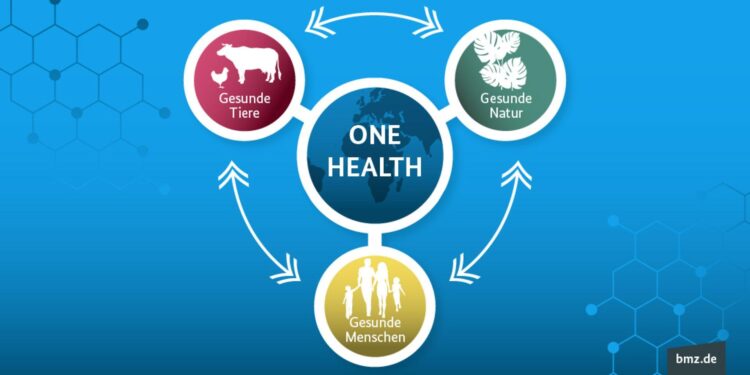A groundbreaking perspective is emerging in the fight against global health threats: the integration of ecology into the “One Health” approach. As infectious diseases continue to surge and environmental disruption accelerates, leading scientists argue that understanding the complex interactions between humans, animals, and ecosystems is more crucial than ever. In a recent article published in the Proceedings of the National Academy of Sciences (PNAS), researchers make a compelling case that without embracing ecological principles, efforts to predict, prevent, and control zoonotic diseases will fall short. This call to action highlights a pivotal shift toward a more holistic framework, positioning ecology at the heart of global health strategies.
The Crucial Role of Ecology in Strengthening One Health Approaches
Integrating ecological principles is indispensable for advancing “One Health” frameworks aimed at tackling complex health challenges that arise at the intersection of human, animal, and environmental well-being. Ecosystems serve as the foundational backdrop where pathogens, vectors, and hosts interact in dynamic and often unpredictable ways. Without a deep understanding of ecological networks-such as food webs, habitat connectivity, and biodiversity patterns-efforts to predict and prevent zoonotic disease spillovers remain fundamentally incomplete. Ecology offers critical insights into disease emergence, including how land-use changes, species invasions, and climate shifts can alter transmission dynamics, potentially triggering outbreaks.
To effectively operationalize One Health strategies, policymakers and scientists must embrace ecological complexity through multidisciplinary collaboration. The table below highlights key ecological factors that shape One Health outcomes along with their impacts:
| Ecological Factor | Impact on One Health |
|---|---|
| Biodiversity | Regulates pathogen reservoirs and reduces transmission risk |
| Habitat Fragmentation | Increases human-wildlife contact, elevating spillover potential |
| Climate Change | Shifts vector ranges and seasonal disease patterns |
| Species Interactions | Modulate pathogen amplification and dilution effects |
- Ecological surveillance: Essential to detect early warnings of emerging threats
- Conservation efforts: Support ecosystem services that buffer disease risks
- Integrated data systems: Facilitate real-time tracking of environmental and health variables
Bringing ecology into the core of One Health not only enhances predictive capabilities but also fosters sustainable solutions that respect the interconnectedness of all life forms on Earth.
Integrating Ecosystem Dynamics to Prevent Emerging Infectious Diseases
Understanding the intricate interplay between species, habitats, and environmental factors is increasingly recognized as essential to halting the spread of emerging infectious diseases. By viewing health through a multifaceted lens that incorporates ecological principles, we can identify critical vulnerabilities before pathogens spill over into human populations. This approach highlights the importance of maintaining biodiversity and ecosystem resilience as natural buffers against disease transmission. For instance, changes in land use, wildlife trade, and climate disruptions often create hotspots where pathogens can jump between animals and humans, underscoring the need for proactive ecosystem management.
- Surveillance of zoonotic reservoirs: Tracking wildlife populations to detect early warnings of infection.
- Habitat preservation: Protecting natural buffers to limit pathogen spread.
- Integrative data modeling: Combining ecological, epidemiological, and social data to anticipate outbreaks.
| Factor | Impact on Disease Dynamics | Examples |
|---|---|---|
| Biodiversity Loss | Reduces ecosystem resilience, increasing spillover risk | Deforestation in tropical regions |
| Climate Change | Alters vector habitats and seasonal disease patterns | Expansion of mosquito ranges |
| Human Encroachment | Increases contact with wildlife reservoirs | Agricultural expansion, urban sprawl |
Policy Recommendations for Embedding Ecological Science in One Health Initiatives
Integrating ecological science into One Health frameworks requires a paradigm shift in policy design and implementation. Policymakers must prioritize the establishment of cross-sectoral collaborations that bridge health, environmental, and wildlife agencies. This approach should be supported by investing in ecosystem monitoring programs to detect early signals of zoonotic spillover and biodiversity loss. Additionally, embedding ecological expertise within decision-making bodies enhances the ability to identify systemic vulnerabilities and leverage natural ecosystem services to mitigate health risks.
Effective policy must also mandate the inclusion of ecosystem health indicators alongside traditional human and animal health metrics. Such indicators provide critical insight into the long-term sustainability of interventions and uncover unintended ecological consequences. Below is a table outlining key policy actions and their intended ecological impacts, designed to guide One Health stakeholders toward more holistic outcomes:
| Policy Action | Ecological Impact | Implementation Strategy |
|---|---|---|
| Integrate ecological risk assessments | Reduced habitat disruption | Cross-disciplinary training programs |
| Establish wildlife disease surveillance | Early pathogen detection | Community-based monitoring networks |
| Incorporate ecosystem services valuation | Informed resource management | Collaborative policy forums |
| Enhance environmental data sharing | Improved inter-agency coordination | Open-access digital platforms |
Key Takeaways
As the global community grapples with complex health challenges that cross human, animal, and environmental boundaries, the integration of ecological science into the One Health framework emerges as an urgent imperative. This PNAS study underscores that without a deep understanding of ecological dynamics, efforts to predict, prevent, and manage disease outbreaks will remain incomplete. Moving forward, policymakers, researchers, and practitioners must embrace a truly interdisciplinary approach-one that positions ecology at the heart of One Health initiatives-to build resilient health systems capable of safeguarding both people and the planet.










